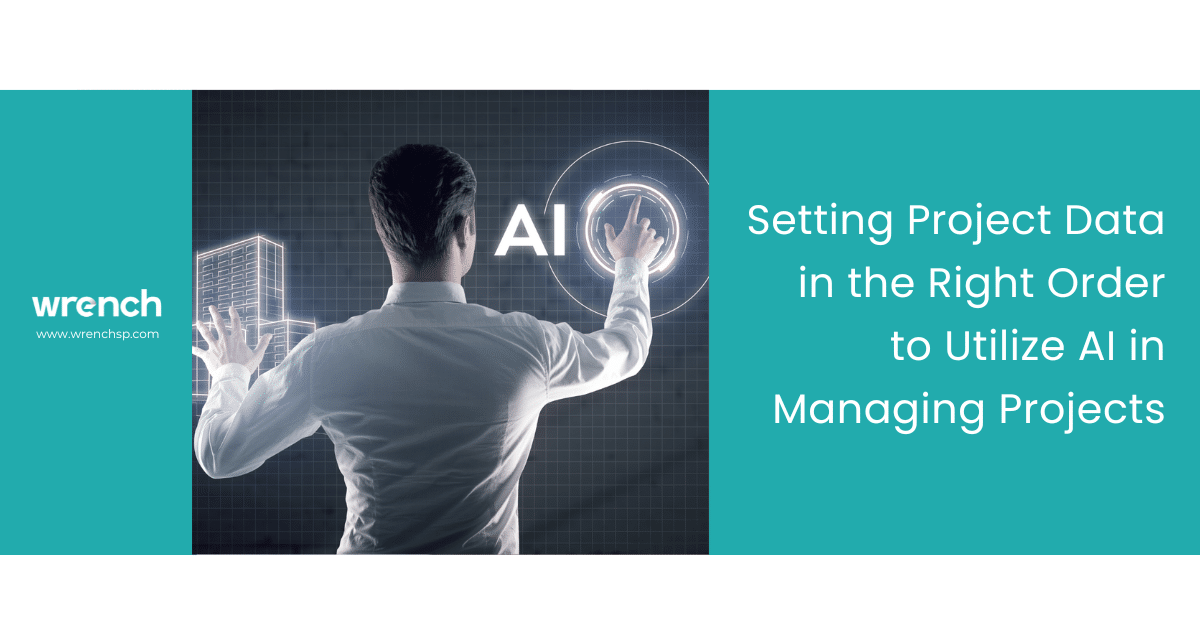Setting Project Data in the Right Order to Utilize AI in Managing Projects

In today’s fast-paced world, managing capital projects efficiently and effectively is essential to achieve the defined project objectives. With the advent of artificial intelligence (AI), project management has been revolutionized, enabling organizations to streamline processes, make informed decisions, and achieve better outcomes. However, to harness the full potential of AI in project management, it is essential to see your project baselines in the right order. Let us examine the key steps to organize project data for optimal AI utilization.
Define Project Goals and Objectives: Have clarity in defining the project KPIs before diving into the project data. Clearly define what you aim to achieve, the desired outcomes, and the specific metrics you will use to measure success. This clarity will help you to understand the direction in which the project is moving and find the right AI tools to interpret and give the right perspective.
Know your Data Source: Identifying and collecting the right data sources is a critical step in utilizing AI effectively. Start by understanding the types of data that are available and relevant to your project. This may include historical project data, current performance, resource availability, market trends, and other pertinent sources. Collaborate with all stakeholders using a common data platform
Ensure Quality and Timeliness of Data: Data quality plays a vital role in the success of AI applications. Ensure your project data is accurate, updated, consistent, and free from errors. Ensure that data is captured from the source as and when the action is happening without any intermediate stages or manipulations and minimize manual interventions or avoid them altogether. Ensure that data is available in a structured format that is easily accessible and understandable for AI algorithms.
Determine Key Performance Indicators (KPIs): To effectively measure project progress and performance, identify the key performance indicators (KPIs) that align with your project goals. These indicators will serve as benchmarks for evaluating trends and providing feedback to AI algorithms. Whether it’s the schedule, progress, cost efficiency, resource availability, productivity, risks, etc, establishing measurable KPIs that can be tracked throughout the project lifecycle is vital.
Apply Machine Learning and Predictive Analytics: Utilize machine learning and predictive analytics to gain insights from the project data. AI algorithms can analyze large volumes of data to identify patterns, predict future outcomes, and make data-driven recommendations. These capabilities enable project managers to make informed decisions, identify risks and opportunities, and optimize resource allocation.
Real-Time Monitoring: AI-driven project management is an iterative process. Continuously monitor the project data and assess the performance of AI algorithms. Keep track of all developments as it happens and any changes in project scope, requirements, external factors, etc. Regularly refine and update your AI models to ensure they remain effective and aligned with project objectives.
Foster Collaboration and Learning: AI should not replace human expertise; rather, it should augment it. To that end, encourage collaboration among project team members, clients, and vendors, share insights, refine models, and learn from the project data. Embrace a culture of continuous learning and improvement, leveraging AI as a tool to enhance decision-making and project performance.
Conclusion: Effectively utilizing AI in project management requires setting project data in the right order. By defining project goals, identifying relevant data sources, cleansing, and organizing data, establishing KPIs, applying machine learning, and continuously monitoring and adapting, today’s project organization can effectively unlock the full potential of AI, and with AI-driven insights, project managers can make informed decisions, optimize resources, and achieve successful project outcomes in today’s data-driven world.
it’s time to embrace the power of AI and transform your project management practices to stay ahead of the competition!
Sajith is a Graduate Engineer and certified Project Management Professional from PMI who carries 30 years of industry experience. He has deep domain expertise in EPC who worked with major EPC Contractors and owner organisations in the Oil & Gas sector, including Petrofac, KNPC, KIPIC, Chevron, Almeer, BPL Ltd etc.. Sajith has executed EPC projects valuing around 500 M USD, and has been associated with a 16 billion USD new refinery project in Kuwait.
Related Posts

EDMS Features and Functions
When an EPC organisation, be it an owner, architect, contractor, or consultant, starts on a journey of digital transformation the first step is likely an EDMS or engineering document management system. The expectation is that…
- 10 Apr 2025

Engineering DMS vs Electronic DMS
The term EDMS has become commonplace in engineering-related sectors these days, especially in EPC project verticals where the management of technical documentation is a key factor in successful project delivery. It must be noted that…
- 04 Apr 2025
Archives
- April 2025
- March 2025
- February 2025
- January 2025
- November 2024
- October 2024
- September 2024
- August 2024
- July 2024
- June 2024
- May 2024
- April 2024
- March 2024
- January 2024
- December 2023
- November 2023
- September 2023
- August 2023
- July 2023
- June 2023
- May 2023
- April 2023
- March 2023
- February 2023
- January 2023
- December 2022
- November 2022
- September 2022
- June 2022
- May 2022
- April 2022
- March 2022
- January 2022
- November 2021
- October 2021
- July 2021
- June 2021
- May 2021
- March 2021
- February 2021
- January 2021
- December 2020
- November 2020
- September 2020
- August 2020
- June 2020
- April 2020
- March 2020
- February 2020
- January 2020
- November 2019
- October 2019
- September 2019
- August 2019
- April 2019
- March 2019
- December 2018
- October 2018
- September 2018
- August 2018
- July 2018
- June 2018
- May 2018
- April 2018
- January 2018
- November 2017
- October 2017
- September 2017
- May 2017
- April 2017
- March 2017
- February 2017
- January 2017
